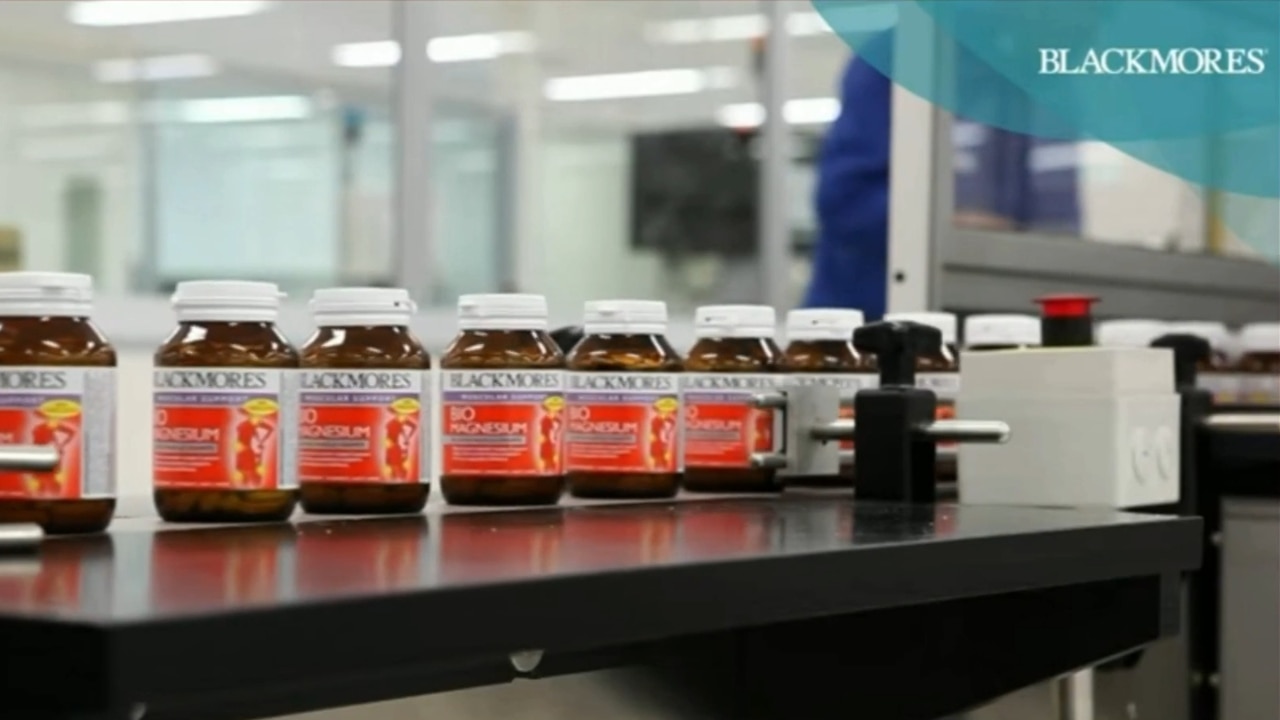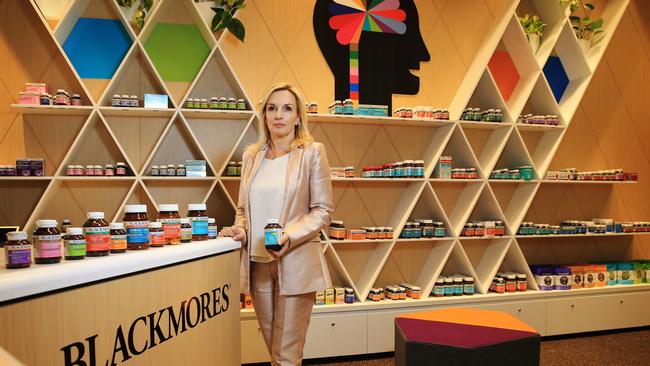The rollercoaster ride that put a complementary medicines business within Kirin’s reach
Blackmores has endured years of drama but a blockbuster takeover deal from Japan’s Kirin may bring an end to the corporate rollercoaster.

Eight years ago Blackmores was the toast of Australia as its share price vaulted above $200.
Then chief executive Christine Holgate attributed the vitamin company’s meteoric rise to luck, or more precisely good fortune.
Holgate told me in early 2016 how she had visited a Chinese fortune teller in Chatswood.
“He looked at me and held my hand and said … if you wear something green and meet Xi Jinping, good fortune will come to you,” Holgate says.
“I didn’t have anything green. I had gotten allergic to the colour as it was my school uniform.”
So armed with a jade-coloured pendant – and somehow getting her mobile phone past security – she managed to snare a selfie of herself and President Xi. Blackmores shares then rocketed 520 per cent.
But then it had a lesson in gravity. Blackmores crashed back to earth with a thud.
Its luck had clearly run out and suddenly it was ripe for a takeover, which eventuated this week in Japanese brewing giant Kirin’s $1.85bn bid for the company, priced at $95 a share.
The years since Holgate’s famous selfie have not been kind to Blackmores.
In August 2020, it sacked about 10 per cent of its workforce and scrapped its final dividend. The flow of cashed-up Chinese tourists came to an abrupt halt following pandemic-fuelled travel bans.
Meanwhile, its shift from being just a brand owner to a fully integrated vitamin company – after it bought Catelent’s factory in Melbourne’s southeast for $43m in 2019 – weighed on earnings.
But worse was to come.

In October, 2021 a high-profile feud erupted between its former biggest shareholder, Marcus Blackmore, and then chair Anne Templeman-Jones.
Blackmore – whose father Maurice founded the company in the 1930s – declared on the front page of The Australian that Blackmores had lost its way.
He was clearly aggrieved with the company’s financial performance. Blackmore highlighted its decision to only start exporting to India in mid-2021 as one mistake, saying it should have launched in the subcontinent in 2019.
Instead Blackmore said it had become bogged down in consumer research after already completing extensive studies of the Indian market.
Templeman-Jones offered another reason for Blackmore’s fury. She accused him of displaying disrespectful behaviour before he stood down from Blackmores’s board in October 2020.
Blackmore retaliated, saying he had been vilified.
Regardless, it was a disastrous breakdown in the company’s relationship with the man whose family name was on the door. Blackmores was first and foremost a marketing company and a scrap with its biggest shareholder clouded its broader narrative and impeded its turnaround.
Marcus Blackmore cared deeply about the company, and still does, and would argue he had its best interests at heart.
Clearly a fair chunk of its retail investors agreed with him, with Templeman-Jones’s election at Blackmores’s 2021 annual meeting attracting only 58 per cent of shareholder support.
Blackmore declared that his relationship with Templeman-Jones had become “poisonous” and a year later she resigned.
Templeman-Jones brought a different style of leadership to what Blackmore was used to. During his tenure as executive chairman he was known for being “hands on”, with his office beside Holgate’s, who he mentored. The office doors would frequently open as they shared ideas on the company.
But in Blackmore’s mind, that door was slammed shut under the new leadership, and forsty relations have only recently started to thaw.
The reality is Blackmores had evolved into a company Blackmore struggled to recognise, rightly or wrongly.
“The board decided they’d sack you if you weren’t double-vaccinated (against Covid-19). People were thrown out of the place with next to no notice – even my own assistant got one day’s notice,” Blackmore said this week.

“We would have never done things like that.”
But Blackmore conceded one big error – the company’s reliance on the Chinese daigou or reseller market.
“We got caught by the Chinese government deciding that if you bought Blackmores’ product from the discounters – like Chemist Warehouse – and ship the product to the platforms in China, then from now on you would have to be registered, in inverted commas,” Blackmore said.
“In other words that means you’ll have to pay tax.
Now, a large part of the daigou business was particularly charged up by something like 150,000 Chinese students in Australia and so we lost over $100m worth of sales through that. So we got caught with our pants down.”
But after 2021’s disastrous annual meeting, Blackmores under chief executive Alastair Symington was ready to stage a comeback, launching its first brand blitz in six years.
The company aimed to capitalise on lockdown lethargy as Australia’s two biggest states opened up from pandemic restrictions and more people got off the couch and enjoyed the freedom of the outdoors.

“As the country reaches the more than 80 per cent vaccination rates where Australians are now going to re-engage with their health journeys … there will be a real need for empowerment from consumers to take back control of their wellbeing,” Symington said at the time.
“It then allows us to then reinforce the trust that we are looking to provide anyone re-engaging with their personal health.
“So this concept that good health changes everything is really the beginning of a well constructed, multi-level health initiative that focuses on all aspects of living a healthy life.”
But by August last year, investor patience was starting to wane, with its shares slumping 10 per cent after it delivered its full-year results. Symington refused to be drawn on future earnings, despite the company reporting record growth and a rise in revenue in key markets.
JPMorgan analysts said at the time the lack of detail about future earnings meant the ongoing issues with supply would lead to a downgrade to earnings consensus.
“The company did not provide a quantified outlook but highlighted supply chain disruption, Covid-19 lockdowns, higher inflation and dampening consumer confidence,” JPMorgan analyst Russell Gill told investors last August. “While the FY22 result was in line with expectations, the lack of quantified FY23 outlook and concerns on consumer confidence will likely see consensus trim forecasts.”
As for Blackmore, he was invited to speak at Griffith University’s Business School on the Gold Coast.
“It’s been one of things that I’ve been involved in lately. I went up there and said I’ll give you a speech on how to build a business but I’ll also give you a speech on how to bugger it up, and they just loved it,” he said.
“I have the view that we can probably learn most from our mistakes rather than our successes.”
But Kirin has high hopes for Blackmores as it looks to accelerate its diversification away from beer and deepen its exposure to pharmaceuticals and health sciences, which currently represent about 25 per cent of its revenue.
“When people ask me why would I support a company like Kirin – that’s a beer company – I say, well, they’re trying to develop their health sciences division. They’ve already got the No.1 immunity product in Japan, they’ve got partial interest in other vitamin companies … so they’re not blind to the whole exercise and opportunity,” Blackmore said.
“They’ve shared with me their long-term plan, that’s what happens with Japanese companies. They take a longer-term view about things, certainly more than private equity.”
Kirin president and chief executive Yoshinori Isozaki said: “Blackmores presents an exciting opportunity to transform the scale and reach of our Health Science domain.
“Kirin Group is working to create social value and economic value by solving social issues through our business activities, and we have been transforming our business from a brewing business to the business model creating value across food and beverages and pharmaceuticals domains, based on the concept of CSV (Creating Shared Value).”
That shared value has even extended to offering Blackmore an advisory role. Time will tell whether under Kirin’s ownership, Blackmores will fly again.






To join the conversation, please log in. Don't have an account? Register
Join the conversation, you are commenting as Logout